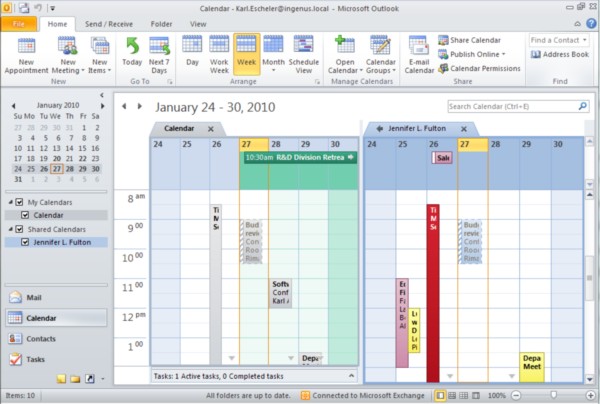By Scott M. Fulton, III, Betanews
 The original reason for Microsoft Office's existence was to provide retailers with an incentive to move product that wasn't moving. The bundle created a discount deal that enabled the momentum behind Excel, which was hot, to help push Word, which was not. It had hardly a tenth of the sales volume of WordPerfect, and Word was a product that retailers had to actively work to sell. This was at a time when software consumed shelf space in stores and was sold like automobiles -- a time which is now essentially gone.
The original reason for Microsoft Office's existence was to provide retailers with an incentive to move product that wasn't moving. The bundle created a discount deal that enabled the momentum behind Excel, which was hot, to help push Word, which was not. It had hardly a tenth of the sales volume of WordPerfect, and Word was a product that retailers had to actively work to sell. This was at a time when software consumed shelf space in stores and was sold like automobiles -- a time which is now essentially gone.
The idea that Office could be a platform came later, with Microsoft's realization -- albeit a late one, and a hard sell for a lot of us outside the company to have made -- that there was more to this multitasking thing than linked and embedded objects. I was a very early believer in the ideal that an application could be customized to suit the functions, requirements, and even tastes of the businesses that use it. I'm proud to say I've had more than just a voice in helping to bring that reality about. It would be a false statement for me to say I predicted this from my seat on the sidelines and it came about; I got off the sidelines, took my tools with me, and worked to bring it about.
My wife and I have been very, very active beta testers of the forthcoming Office 2010, in recent days concentrating on Outlook. History will reveal that Outlook was never my most favorite Office component. Early on, I was skeptical about it even being included with the bundle, wary of Microsoft's consistently irritating tendency to duct-tape one product onto another and call the result a "platform-by-extension." It started out slow and bulky. But it bothered me that so few companies ever dared to compete against Outlook once it started being seen as fused into Office; only in recent days has Mozilla been able to cultivate Thunderbird into a fully feature-competitive alternative.
 What I can say from tinkering with Outlook 2010 is that somebody at Microsoft gets it. Regardless of where we work, how we get to work, how much work we do when we work, or whom with work with, all of our workplaces are becoming more like virtual offices than physical ones. We're supported by the structure of our business connections with one another, as much as by steel beams and concrete. Geography is not the barricade to production that it used to be.
What I can say from tinkering with Outlook 2010 is that somebody at Microsoft gets it. Regardless of where we work, how we get to work, how much work we do when we work, or whom with work with, all of our workplaces are becoming more like virtual offices than physical ones. We're supported by the structure of our business connections with one another, as much as by steel beams and concrete. Geography is not the barricade to production that it used to be.
As Outlook matures, it's providing information workers with newer and more efficient ways to get together with one another, to share tools and not just data, actually becoming the conference room, rather than just a way to notify folks to come to the conference room. But the direction of Outlook's maturity helps cast a light on where the rest of Office is going as well. Unlike anything I've seen that purports to be its competition, or future competition, or slightly categorically similar, Office components are being developed now with the understanding that they are the interconnected conduits through which documents move, rather than the separated silos from which documents are manufactured.

A look at the calendar sharing feature from the public beta of Outlook 2010, which is reliant upon Microsoft Exchange.
So my counter-argument to anyone who thinks Office is obsolete as a platform is that they should experiment with the product not in an enclave, in the separate enclaves where, it seems to me, Google's developers think we live and work, but in a business full of people who do things.
I don't want to make the mistake of saying that simply because I use Office myself, and expect to continue using it for the foreseeable future, you must therefore use it as well, and thus we all must use it, and consequently, Office's place in the workforce is secure. If there is anything I see already in front of the horizon, preparing to change Microsoft's best-laid plans, it is a force it hasn't had to feel in some time: competition. With the rapid evolution of tools, it is becoming easier for smaller development crews to produce more innovative alternatives.
That said, I've yet to see a whole lot of people doing it, which concerns me. All things being equal and open, you'd think there would be a lot of good ideas out there by now. But things in reality are rarely both equal and open at the same time. If I were to approach an investor today with the single best concept for an applications package to dethrone Microsoft Office, I would laughingly be told to go back to my basement and write my little blog.
Where there tends to be obsolescence with respect to Microsoft Office is in the work processes of many of the businesses that rely upon it. We're all welcome to watch Microsoft's marketing videos of spritely folks making easy work out of connecting with one another and exchanging data like cheerleaders in a parade line hurling batons at one another. But the business practices of too many workplaces today are so entrenched in what worked ten years ago and even 25 years ago, that it is their failure to evolve in kind that may be more of a drag on Office's evolution than Microsoft's failure to perform or innovate. There are record-keeping and data sharing features that have been part of Excel for over a decade now, that companies are always shocked, shocked to discover once they're finally pointed out to them...and yet they continue to save data in single rows of long tables in individual sheets in Excel, and cut-and-paste revisions of textual documents from one template to another to another to another in Word. Why, oh why, dear Microsoft, can't you make it easier for us to do what we do?
Complaining about the lack of change with anything -- applications, handsets, PCs, music, hairstyles, government -- can become dangerous in itself. Whining breeds whining.
I foresee the following very realistic possibility: There will be an application that enables me to graphically describe the elements of my business, to assemble them in a working model, and to run simulations on the economic stability of that model, all using graphical tools gleaned from the realm of illustration programs. It will go by the name "Excel." I will compose a series of documents on how best to use this product. I'll be able to study several drafts sequentially, along a timeline, with animations showing where I made changes, and notes I left to myself as to why. I'll see editors' suggestions for alterations as they come in, and I'll be able to accept them at will. The tool for my composition will be called "Word." And I will communicate that composition in progress with my fellow colleagues who will help me to produce and publish it. And we all will be using "Outlook."
That is, unless anyone else has some brilliant ideas. I'm not being sarcastic here. Everything I've ever seen from the open source community, from competitors such as Corel, and elsewhere, insist on maintaining the silo-centric model of document production that looked obsolete to me way back in Office XP's time. Every competitor tries to be a different flavor of Office, when Office is effectively already done. It's like trying to invent another cola, when what the world needs is a real refresher course in innovation. If Microsoft Office were truly to become obsolete, there's a good chance that, in the face of no original, game-changing competition from elsewhere, few would ever know it.
[FULL SEC DISCLOSURE: Microsoft developers and representatives and Scott M. Fulton, III maintain an exchange of viewpoints and advice on Office and other products, as part of a working relationship that spans 25 years. During that time, Scott has authored, co-authored, edited, or assisted in the production of, several dozen books that have been partly or completely about Microsoft Office. Scott is an active participant in Microsoft's MSDN software development program, through which he is given access to beta software in its development stage. No money has ever exchanged hands between these two parties. Scott is, as always, fully responsible for his content.]
Copyright Betanews, Inc. 2010








